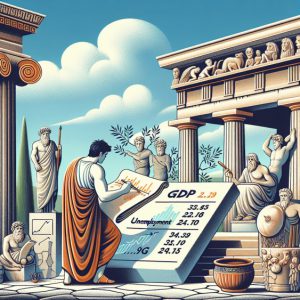
Gold Hedge Against Inflation: Debunking the Hype?
Jan 26, 2024
Introduction: Navigating the Financial Chessboard
In the intricate game of investing, akin to a lively round of chess, each move counts. The question “Gold as a Hedge Against Inflation: A Wise Choice or?” is akin to deciding whether to move a pawn or knight. As a pattern seeker in the market and a chess enthusiast, I find the interplay between mass psychology, the bandwagon effect, and contrarian investing to be a fascinating topic
Gold Hedge Against Inflation: The Shimmering Shield?
While gold’s reputation as a shield against inflation is indeed established, it is essential to understand the dynamics of this relationship. Let’s take the global financial crisis in 2008 as an example. Following the collapse, central banks worldwide began printing money to stimulate economies, naturally causing inflation fears. In response, investors flocked to gold, driving its price up. Yet, paradoxically, the inflation rates remained low in the subsequent years, showing that factors beyond inflation influence gold prices.
Furthermore, the effectiveness of gold as an inflation hedge changes over time. A 2006 study by the World Gold Council found that gold is a more effective hedge in the long rather than the short term. This means that while gold may not always protect against immediate inflation shocks, it can provide stability over extended periods.
Also, geographical factors come into play. Gold’s performance as an inflation hedge varies across countries and is influenced by factors like the stability of local currencies and economic policies. Therefore, investors must consider these nuances when investing in gold as an inflation hedge rather than relying solely on historical precedents.
Gold’s Luster: Not Always a Reliable Reflection
Indeed, gold’s lustre can sometimes be misleading. While it has historically been a go-to asset during inflationary periods, its performance is inconsistent. The early 1980s provide a compelling example of this. Despite high inflation rates, gold prices took a nosedive. This instance underscores that gold’s performance as an inflation hedge is not infallible.
It’s important to remember that gold is an asset subject to various market forces, not just inflation. Investor sentiment, for instance, plays a significant role in determining gold prices. Investors often turn to gold as a ‘safe-haven’ during economic uncertainty. However, when confidence in the economy is high, the demand for gold can decrease, leading to lower prices, regardless of inflation trends.
Moreover, gold’s value isn’t closely tied to the Consumer Price Index (CPI), a widely used measure of inflation. This means that even during inflationary times, the price of gold may not necessarily increase with rising consumer prices.
In addition, other assets, such as stocks, are also considered good hedges against inflation. The conventional wisdom is that companies can pass on increased costs to consumers during inflationary periods, leading to higher profits and, consequently, higher stock prices.
Therefore, while gold can serve as a hedge against inflation, investors must understand its limitations and other factors. Diversifying investments and not relying solely on gold can be a more effective strategy for protecting wealth during inflation.
Mass Psychology and Gold Investing: Following the Herd?
The influence of mass psychology on gold prices cannot be understated. This phenomenon, often called herd behaviour, can lead to significant fluctuations in gold prices.
In times of economic uncertainty or instability, investors seek refuge in what’s considered safe-haven” assets – and gold tops that list. This rush towards gold is often driven more by fear and sentiment than by an analytical evaluation of the asset’s intrinsic value. As more and more investors follow the herd, gold’s price can inflate, often surpassing its actual worth.
This inflated value, however, does not always hold. Just as mass psychology can drive up gold prices, it can also trigger a rapid decline. Investors may start selling off their gold holdings if the economic climate improves or other investment opportunities become more attractive. As this trend gathers momentum, gold prices can drop, sometimes as dramatically as they rose.
This bubble-like behaviour of gold prices was evident during the 2011 price crash. After hitting an all-time high in September 2011, gold prices fell sharply over the next few years as the economy recovered and investor sentiment shifted.
It’s also worth noting that while herd behaviour can drive up gold prices in the short term, it doesn’t necessarily affect the long-term value of gold. This is because, over time, market forces tend to correct price anomalies caused by herd behaviour, bringing prices more in line with the asset’s intrinsic value.
Therefore, while following the herd can sometimes provide short-term gains, it carries significant risks. Investors must make informed decisions based on careful analysis rather than merely following the crowd.
Contrarian Investing: Flipping the Chessboard
Contrarian investing indeed flips the traditional investing chessboard. This strategy involves going against the prevailing market trends or sentiment. Instead of following the crowd and viewing gold as a hedge against inflation, contrarian investors might seek alternative opportunities.
One such alternative could be real estate. Real estate is often considered a good hedge against inflation because property values and the amount of rent landlords can charge tenants tend to increase with inflation. This can provide a steady stream of income that keeps pace with rising prices.
Stocks are another option. While inflation generally harms stock prices in the short term, many companies can pass on increased costs to consumers over the long term. This can lead to higher profits and, consequently, higher stock prices.
Cryptocurrencies have also emerged as a potential hedge against inflation in recent years. Some investors view cryptocurrencies like Bitcoin as “digital gold” because, like gold, a finite amount of Bitcoin can be mined. However, investing in cryptocurrencies carries significant risks due to their extreme volatility and regulatory uncertainties.
It’s important to note that while contrarian investing can yield high returns, it also involves higher risks. Going against the herd means you’re betting against the collective wisdom of the market, which can be risky. Therefore, it’s crucial for investors to thoroughly research and understand the potential risks and rewards of any investment strategy they choose to follow.
Real Estate: A Solid Foundation Against Inflation
Real estate has often been considered a solid foundation against inflation. As construction materials and land costs increase, so do property values. This makes real estate a tangible and potentially more stable hedge against inflation than gold.
One of the reasons real estate can serve as an effective hedge against inflation is because of its intrinsic value. Real estate is a tangible asset you can use, rent out, or live in. As inflation increases the cost of building new homes, the value of existing homes also tends to rise. The home’s replacement cost (i.e., the cost to build an identical home) increases with inflation.
Moreover, real estate can provide a steady stream of income that keeps pace with inflation. For instance, landlords can often increase rents over time, especially in markets where demand outpaces supply. This can help protect landlords from the eroding effects of inflation.
However, it’s important to note that the effectiveness of real estate as an inflation hedge can vary depending on several factors. These include the balance of supply and demand in the market, the type of inflation (demand-pull or cost-push), and how leases are structured.
In addition, while real estate can provide a hedge against inflation, it also comes with its own set of risks. These include property market downturns, interest rate increases, and the ongoing costs of property maintenance.
Stocks: A Stake in Economic Growth
Stocks, also known as equities, represent a share of ownership in a company. They offer investors a stake in a company’s future earnings, which often increase with inflation. Companies can raise prices to offset increased costs, boosting profits and potentially share prices.
When investors buy stocks, they’re essentially buying a piece of a company’s future growth potential This is particularly true for growth stocks, which are shares in companies whose revenue is growing faster than average. These companies often reinvest their profits into the business to fuel further growth rather than paying dividends to shareholders.
However, investing in stocks is not without risks. Stock prices can fluctuate dramatically, and the size and frequency of these fluctuations, known as the stock’s volatility, can be an essential measure of investment risk. Economic events, business environment changes, and inflation affect stock prices.
For example, high inflation can pressure growth stocks since it reduces the future value of their expected earnings. On the other hand, some companies may be able to pass on increased costs to consumers, leading to higher profits and potentially higher stock prices.
Cryptocurrencies: The Digital Frontier
Cryptocurrencies like Bitcoin have indeed been dubbed “digital gold.” They have attracted a lot of attention as potential hedges against inflation. This is partly because, like gold, a finite amount of Bitcoin can be mined. This scarcity is one of the reasons why some investors view Bitcoin as a store of value that can hold up well during inflationary times.
However, cryptocurrencies are highly volatile. Their prices can fluctuate dramatically in a very short time. Various factors, including regulatory news, technological changes, and investor sentiment shifts, can drive this volatility.
Moreover, cryptocurrencies are largely unregulated. This lack of regulation can make them a risky choice for investors. It can lead to market manipulation and fraud, and it also means that investors have little recourse if things go wrong.
Another risk factor is the susceptibility of cryptocurrencies to mass psychology. Like gold, investor sentiment can drive up cryptocurrency prices, creating a bubble that could burst when the bandwagon effect fades.
In conclusion, while cryptocurrencies like Bitcoin may offer a potential hedge against inflation, they come with significant risks. Their high volatility, unregulated nature, and susceptibility to mass psychology make them risky for investors. As always, investors must research and understand the risks before investing in cryptocurrencies.
From this point, let’s embark on a journey through time. From a historical perspective, learning from the past prevents repeated mistakes and may even pave the way for future success. It also sheds light on our real-time actions, offering valuable insights into our decisions as they unfold.
Indeed, the naysayers and doctors of doom were ever so occupied with proclaiming that all of Hell was unleashing itself in China. Many of these penguins lacked comprehension, nay, even awareness, that manifold rationales exist for diminishing China’s reserves.
- Once deemed valuable, the reserves are now rendered worthless dollars, prompting China to seek diversification by transferring its funds from dollars to gold and other tangible assets. They do not wish to hold onto frail paper that the Federal Reserve can conjure at its leisure.
- Instead of holding onto this currency, China could have employed it to pay down debts, putting the funds to good use. Alas, the U.S. persists in inflating the supply of dollars at an astonishing rate.
- Finally, China has directed its resources towards new infrastructure projects, wisely investing funds. Indeed, improving a nation’s infrastructure creates jobs and yields high returns over the long haul. Behold the United States, whose infrastructure is disintegrating with each passing day, resembling ever more a Third World country, costing the economy billions of dollars.
China’s Staggering Reserves
Notwithstanding the cacophony, our reserves have swelled to the princely sum of $3.21 trillion, exceeding by a staggering $3.2 trillion the paltry holdings of the needy and unfortunate United States. That nation’s only proficiency lies in profligate currency printing to bolster its despotic government.
Regarding the matter, Mr Hu opined that the greenback should gain momentum in the coming months in expectation of a Fed-induced rate hike. The outflow of capital may recur, rendering this annum a most tumultuous.
However, I must strenuously disagree, sir. Thy assertion that the Federal Reserve shall indeed effect a rise in rates is simply preposterous. It is far more likely that rates will be lowered as the contemporary world has embraced the practice of negative rates. Thy statement, therefore, is but the idle prattle of one who hath imbibed some hallucinogenic substance.
Hence, China must take measures to safeguard against the pernicious effects of inflation. In this regard, it would behove the nation to consider diversifying its holdings by investing in Gold as a hedge against inflation. Such a strategic move shall serve as a productive hedge against the ravages of inflation, thereby preserving the nation’s economic stability.
China 2023 Update
In light of these reports, it seems clear that China is taking steps to reduce its reliance on the US dollar and increase its holdings of gold. While the exact motivations behind this strategy may be complex and multifaceted, it is clear that China sees gold as a valuable hedge against inflation and a key component of its efforts to diversify its reserves. As such, it will be interesting to see how China’s gold-buying evolves in the coming years and its impact on the global gold market.
Several recent reports indicate that China has been reducing its exposure to the US dollar and increasing its holdings of gold as a hedge against inflation. Here are a few examples of such articles:
- “China hoards gold as it seeks to reduce reliance on US dollar” (The Guardian, October 7, 2020) – This article reports that China has been buying gold steadily in recent years and is now the world’s largest producer and consumer of the metal. The author suggests that this trend reflects China’s efforts to reduce its dependence on the US dollar and hedge against inflation. https://www.theguardian.com/business/2020/oct/07/china-hoards-gold-as-it-seeks-to-reduce-reliance-on-us-dollar
- “China ramps up gold reserves as trade war drags on” (Financial Times, August 7, 2019) – This article reports that China had added nearly 100 tons of gold to its reserves in the first seven months of 2019, bringing its total holdings to over 1,900 tons. The author suggests that China’s move into gold is part of a broader strategy to reduce its exposure to the US dollar and diversify its reserves.https://www.ft.com/content/5b5f5c18-ba3a-11e9-8a88-aa6628ac896c
- “China’s gold-buying spree continues as it seeks to diversify reserves” (CNN Business, July 8, 2021) – This article reports that China had added 10 tons of gold to its reserves in June 2021, bringing its total holdings to 1,948 tons. The author notes that China’s gold-buying has been partly driven by concerns about inflation and the value of the US dollar. https://www.cnn.com/2021/07/08/investing/china-gold-reserves-inflation/index.htm
Conclusion: Gold as a Hedge Against Inflation: A Wise Choice or?
Much like a well-played chess match, investing requires strategic thinking and a deep understanding of various factors. While gold has traditionally been viewed as a hedge against inflation, it’s not always the best move.
Real estate, for instance, often appreciates over time, even with inflation. As construction materials and land costs increase, so do property values. This makes real estate a tangible and potentially more stable hedge against inflation than gold.
Stock offers a stake in a company’s future earnings, often increasing with inflation. Companies can raise prices to offset increased costs, boosting profits and potentially share prices. So, stocks can provide a more substantial hedge against inflation than gold.
For the risk-tolerant, cryptocurrencies like Bitcoin have been dubbed “digital gold.” While highly volatile, some believe they offer a hedge against inflation. However, their unregulated nature and susceptibility to mass psychology make them a risky choice.
The key is not to follow the herd but to assess the board carefully and make informed decisions. Diversification is crucial in investing. It’s about balancing a mix of assets in your portfolio according to your risk tolerance, investment goals, and time horizon.
Remember, every investment comes with its own set of risks and rewards. It’s essential to do your research or consult with a financial advisor before making any investment decisions.
Additional Insights

IPI Stock Price: Ascending Star or Descending Dagger?

Silver and Gold Bull: Charging-Poised for a Powerful Move

Stock Market Manipulation: The Dominion of Financial Engineers

Strategic Safeguard: How to Prepare for a Stock Market Crash

Permabear Doomster Debacle: Daring to Defy the Dire Predictions!

How Much Money Do You Need to Invest in Real Estate?

Mass Media Manipulates: Balancing Awareness and Trend Adoption

What is Mainstream Media? Navigating the Web of Truth & Deceit

Market Mastery: Unconventional Paths to Stock Market Success

The Pillars of Investment Success: Cultivating Patience and Discipline

Contrarianism and Mass Psychology: A Dynamic Duo for Market Success

How much money do i need to invest to make $1000 a month?

What are the leading economic indicators supposed to predict?

Examples of Groupthink: Instances of Collective Decision-Making



